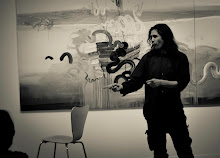"If Berkeley says there is no matter, then it matters not what Berkeley says!"
I am just starting to work out how to perform one of the sadly under-read greats of British empiricism - the Irish Bishop George Berkeley. My problem is exactly how to present him. I mean Berkeley is not widely read, and yet his fundamental point, that for humans 'Essence is Perception', so if a thing is in our minds it is real (for us, at least), is one of the touchstones of philosophy, and is so for a number of reasons. Firstly it is one of those ideas you read and understand, and wonder if it is true. Secondly, there is something rather subtle going on here. For it is not just the world's essence that is defined in perception but also our own. It is then in perceiving a world apparently beyond our minds and yet within which we are, and in which we actually exist: so that we and the world are given in the same created-creative glance. This is then a theory of how one 'is' only through a relation to an elusive Other (the good Bishop's actual argument being that this Other is actually God). Thirdly, in a world of virtual reality, where truth is defined on computer screen, it is an idea with a new cadence, and power: Our reality does once again lie in perception. - All of which makes rich performance material, and requires the philosopher to be subtle enough to say this, without going beyond Berkeley's text.
However it is at this point the problems start. You see Berkeley is actually really very subtle. In the midst of his main argument there are all sorts of lovely arguments about the nature of language, of Causes and of God. The problem is that these are arguments that other philosophers would have written greatly about, but which the young Berkeley raises as interesting points, makes a pithy argument about and then moves on. The reader is then left wanting more. This is of course a powerful philosophical trick. It meant that for many years thinkers read and quoted Berkeley, as they made a philosophy and so a living out of what he never quite managed to say.... Any faithful performance of Berkeley must therefore frustrate an audience at the same moment it intrigues it.
Moreover there is one last point that must be bought out, if never stated. Berkeley only writes one short philosophy book, and does so as a young man. What is more, the main purpose of this book lies not in pure philosophy, so much as theology. He wants to demonstrate that we need to assume God, to perceive the world at all (and so to be). This hurry to God, and the dismissal of the world as a consequence (it is only what God gives to me), can and has made Berkeley a figure of philosophical fun - and even a stooge. Here is a man whose argument appears to actually be straw, and can be attacked accordingly. To get this element of Berkeley out there, so the audience can hear it, and yet also hear the rather interesting and powerful things Berkeley is also saying about our relation with whatever is really outside us, must be the real trick of this performance. If the audience all think the same thing at the end of the piece, then I have failed in my job, and let George down!
In short, why I have put Berkeley off all this time, is because I have always deeply respected him, and realised that to get him right is a challenge... but one that must be addressed at some time (if nothing else to do justice to British thought, I usually make Locke a figure of fun after all, and perform Hume too rarely). And that time had better be now. For Berkeley is the first great ethical thinker of our encounter with an Other, an encounter which he understands and renders moral in the same moment. He is therefore a philosopher whose time is now, and who has never had more to say to us all, and I can only hope I do not, as so many have, not do him justice!


No comments:
Post a Comment